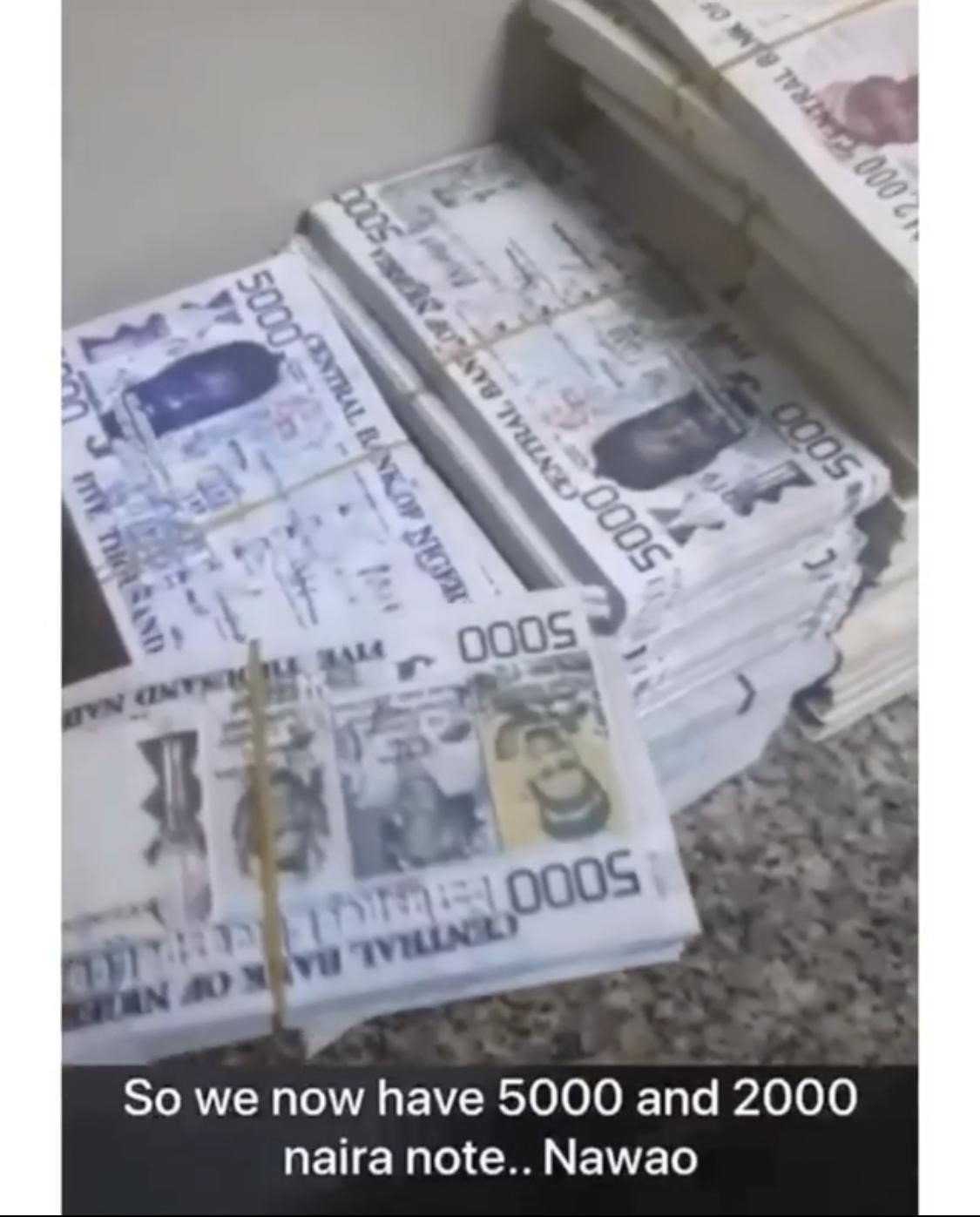CBN Did Not Introduce 2,000, 5,000 Naira Notes As Claimed In This Video
Claim
A video circulating on WhatsApp shows some bundles of new 2,000 and 5,000 naira notes with the name of the Central Bank of Nigeria (CBN) clearly printed on them.
The 30 seconds video was shared and forwarded to WhatsApp groups and posted on statuses of some users with a claim that it is a new naira note from the CBN.
Verdict
A verification has revealed that the claim is false. CBN has neither printed nor introduced 2,000 or 5,000 naira notes.
Full Text
A 30-seconds video recently shared on messaging app, WhatsApp, shows some bundles of currency notes with the name of the Central Bank of Nigeria at the top of each of the notes.
The voice of a woman over the video could be heard saying that a customer went to a bank branch she works at to deposit the money.
“A customer came here today to deposit this money in my branch,” she said.
“This is how the money looks like. 5,000 naira notes. This is seventeen million,” she added while showing the money in the video.
The video was captioned “so now we have 5,000 and 2,000 naira notes… Na wao.”
Verification
To verify the claim Dubawa contacted the Head of Corporate Communication of the CBN, Isaac Okoroafor, who replied that the claim is “utterly false.”
Also recently, the CBN, on its Twitter account reacted to the claim, branding the video as false:
“Videos and pictures of purported circulation of N2,000:00 and N5,000:00 banknotes are false and fake. Members of the public are advised to disregard such falsehood and to report anyone found in possession of such banknotes to the law enforcement agencies.”
Dubawa further checked the requirement to introduce new notes to the economy as provided in the CBN Act.
Section 18(a) and 18(b) of CBN Act 2007 gives the Central Bank absolute power (with no legislative intervention) to:
(a) arrange for the printing of currency notes and the minting of coins;
(b) issue, re-issue and exchange currency notes and coins at the Bank’s offices and at such agencies as it may, from time to time, establish or appoint;
In a 2012 address, when Nigeria was in the process of ‘currency restructuring,’ the former CBN Governor, Sanusi Lamido Sanusi, briefly traced the process involved in minting, all to be executed by the CBN:“The CBN is responsible for the entire process of currency production and it includes the following elements: design, production, storage, distribution and the disposal of unfit banknotes.
“It entails the CBN being responsive to the changing needs of the economy and keeping pace with evolving trends in contemporary currency technology-world.”
Further, an online verification of the video revealed that it has been online since January 2020 and was also uploaded to a YouTube page.
A source from the CBN who pleaded anonymity said the currency was not from the CBN although there was a failed attempt by the former CBN Governor, Sanusi Lamido Sanusi, to introduce the currency.
In 2012, CBN under the governorship of Sanusi Lamido Sanusi (now Muhammadu Sanusi II), announced a plan to introduce a new 5,000 Naira note.
Several debates and criticisms stopped the CBN decision to introduce the new Naira note.
This then leaves the question about from where the notes in the video emanated.
Conclusion
The claim that the Central Bank of Nigeria has introduced a new 5,000 and 2,000 naira notes is false.
This fact-check is produced per HumAngle partnership with the Dubawa 2020 Fellowship to facilitate the ethos of “truth” in journalism and enhance media literacy in Nigeria
Support Our Journalism
There are millions of ordinary people affected by conflict in Africa whose stories are missing in the mainstream media. HumAngle is determined to tell those challenging and under-reported stories, hoping that the people impacted by these conflicts will find the safety and security they deserve.
To ensure that we continue to provide public service coverage, we have a small favour to ask you. We want you to be part of our journalistic endeavour by contributing a token to us.
Your donation will further promote a robust, free, and independent media.
Donate HereStay Closer To The Stories That Matter






So many things are considered rumour in Nigeria. As for me, I think it’s time we know the truth. This news has been on the air for decades